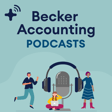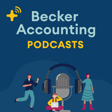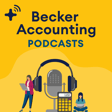
Balancing the Future Ep. 21 - What It Takes: Success from Technical to Personal with Sam Johnson
Our host, Chris Mitchell, engages in a compelling conversation with Sam Johnson, seasoned executive and former Vice Chair at EY. Sam shares insights from his journey to becoming a leader in public accounting, emphasizing foundational technical skills, continuous learning, and adaptivity for career advancement. He reflects on the value of relationships, and inspires professionals at all levels to invest in personal growth and mentorship.
Earn CPE by listening to this podcast through a Becker Prime CPE subscription.
Listen to this episode through your Becker LMS platform to complete practice questions, pass the final exam, and earn CPE credit.
Already a Becker Prime CPE customer? Login here.
Have access to Becker CPE through your employer? Earn CPE credit for this podcast however you consume Becker CPE, either through your company’s LMS or via the Becker platform. Not sure where to log in? Check with your CPE admin.
Learn more about CPE Podcasts from Becker: https://www.becker.com/cpe/becker-podcasts


